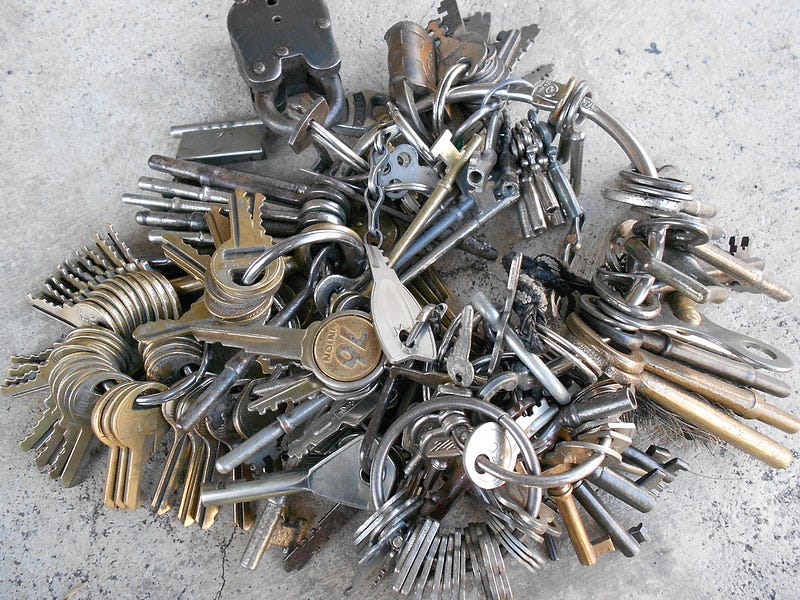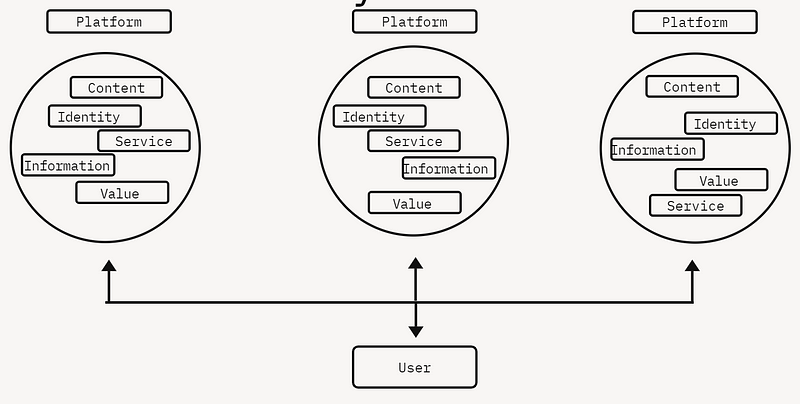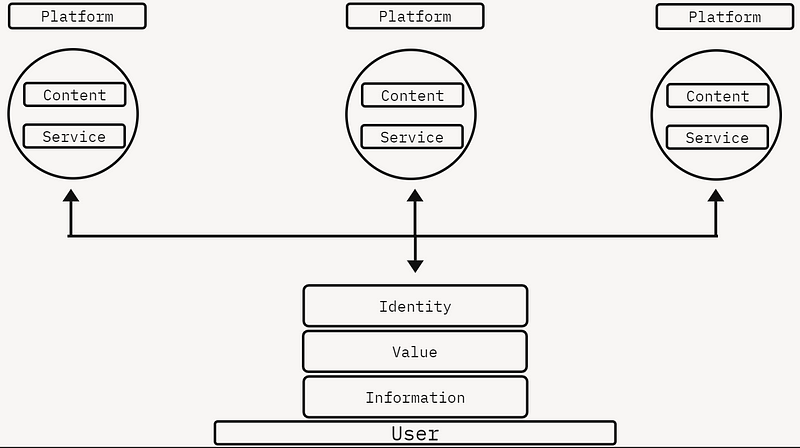How many accounts do you have? I reckon I must have over 400 accounts I use in the course of a year, and well over 1500 that have been created over two decades. This is bananas. So how many do you have? I’d be willing to bet no one who reads this has less than 100 accounts that they use within the course of a year. So why do we have so many accounts? What’s an account anyway? Accounts are the primary way by which we maintain access restrictions to different networks and services, and presumably they fulfill the role of authenticating our identity. It’s how we prove to the system that we are who we say we are, and that we should have access to that system given our identity. But in reality an account is nothing more than a unique key to access a certain system issued to you on the basis of your identity, and we’re all walking around with keychains holding hundreds of keys.

If an account is a representation of your identity and now you find yourself managing hundreds of accounts simply to access the apps and services that have become a part of daily life, effectively with one key per app, it’s safe to say that something’s gone awry. Managing your accounts has become such a pain that there’s now a billion dollar plus industry of password managers built to help each one of us manage the steadily increasing number of accounts we have, and a growing industry of passwordless products offering solutions ranging from email links to biometrics. Roaming the internet carrying around massive keychains is not how anyone imagined their drive on the information superhigh way.
Don’t we all want to experience an accountless internet? Or at least an internet where we have less accounts? For myself, and I’d bet that for others as well, signing up for a new account is a pain in the ass that I’d rather never experience again. In fact the only time I’d be interested in creating a new account is when I would want to create a new online identity, one to be managed separately from an existing one. Say for example a pseudonymous Twitter account, and for any case where I want to represent the same identity I want no additional accounts. But what is actually happening in the current state of the internet is that I’m required to open new accounts for most new applications or services I want to use. Sure Google and FB’s SSO have helped reduce this pain to some extent but I still regularly find myself reluctant to use it for many applications given the at times creepy nature of these companies practices and business models. I generally trend towards minimizing my reliance and association with them, and I don’t think I’m the only one. So we have this shitty situation where we’re roaming the wilderness of cyberspace with massive keychains, and every time we see a useful system we may want to interact with we’re forced to decide whether or not we want to add another key to our already heavy keychain. This is not the internet we were promised.
There’s got to be a better way.
Enter Ethereum
For the past three years I’ve spent an increasing amount of time using applications built on Ethereum, but it wasn’t until I had to switch password managers that I realized that Ethereum (and Public Key Infrastructure more broadly) enables the accountless internet of my dreams. Throughout my time using Ethereum based apps I never had to log in anywhere. I never had to create a new account for each new app. There’s something magical about how well this works in practice, something much more magical than any email based magic-link could ever be. The most hassle I’d encounter was clicking the ‘Connect Wallet’ whenever I visited a new app, and instead of roaming the web holding on to a massive and ever increasing keychain, I now just had to hold on to a single account’s information, my seed phrase.

After several months where I’d spend more time with Ethereum applications it became difficult to go back to the regular internet, where visiting any app required a new sign in, and the request to create an account whenever I’d discover a new app I want to use began to feel like digital assault. What started off as a pleasant improvement in convenience and user experience quickly evolved into a massive revelation about the prospect of a true digital identity. It was wonderful to never have to sign in to any apps, and to know that everything I do in this version of the internet is controlled from a single point of access. It’s such a marked improvement in user experience that it’s hard to imagine why we ever settled for anything less until now. But the big revelation only came later, as I’d begun creating and using different Ethereum accounts for different types of activities. My Ethereum accounts began to represent my digital identity in a more comprehensive way than any of the single accounts I had been using for the ever increasing list of apps I’d frequent. Each account contained a unique set of information and value that I had amassed through my activities, and from those there was an emergent digital identity. I could maintain those identities independently, or cluster them to create other unique identities. It is completely up to me whether or not I want to have only one account, and thus one identity, or if I want to have multitudes. Gone is the massive keychain holding a unique key for each of the hundreds of applications I use, and instead there’s something more like a keycard, or perhaps the digital equivalent of a fingerprint.
In this accountless internet I can access whatever application I want with just a single action, whether it’s a click, a swipe, or a scan of a fingerprint. I believe this accountless experience is one of the most meaningful innovations in recent years but so far it seems to have gone under most people’s radars.
Emergent Identity
What do I mean by emergent digital identity, and what does Ethereum’s accountless internet experience have to do with it? Digital Identity has been a hot topic for years, and there’s been enough written about it that you don’t need me to tell you about it or its history. What I will tell you is that its 2021 and there’s still no global digital identity, the dozens of efforts to establish even national digital identity throughout the years have generally failed. I believe that a global digital identity will eventually exist, but it will be an emergent phenomena as opposed to a directed effort to create one, and I believe Ethereum accounts have the best opportunity to be the foundation from which a global digital identity emerges.
Why does it need to be emergent? Well, how likely are you to sign up for a digital identity service? Imagine some tech luminary decided that their next startup will be a digital identity startup, and they decide to create an app that will allow you to mint your own digital identity, you just download it, sign up, perform some identity proof and you’re off the races! Would you sign up for it? For whatever reason this doesn’t appear to be appealing to most people. Maybe it’s because it feels creepy, or maybe it’s because there’s no immediate reason to use such an app and so there’s no urgency? What ever the reason may be, asking people to sign up for a digital identity service does not seem to work. However asking people to sign up for a messaging service so they can communicate with their friends, or asking them to sign up for payments app so they can pay their friends or businesses does seem to work quite well. Twitter, WhatsApp, PayPal, Venmo, and others like them are incredibly popular and offer some form of a digital identity. I can find your account on any of those platforms and I can either message you, or send you some money, and I can know with some certainty that I’m transacting with the username I think I’m transacting with. If a digital identity is formed on the basis of our information, i.e. the messages we exchange with others, the writing we put out into the world, and of value, i.e. what do we own? what do we exchange with others? then it’s easy to see how these sorts of applications begin to look like forms of digital identity. Maybe it’s not the case that this is how identity forms, and rather that simply exchanging information and value requires some form of identity so that we know who said what, who is saying what to whom, who owns what, and who sent what to whom. Perhaps it doesn’t matter whether identity is formed on the basis of information and value or it is formed because it is required for their exchange, but what matters is that the combination of both appears to lead to the emergence of a unique identity. The sum total of the information we put out into the world and of value we exchange, create, and lose, both private and public, is the foundation for a unique identity.
Back to Ethereum. By being a universal access key to every application that is unique to each user, and by those applications facilitating the exchange of information and value an Ethereum account becomes a strong form of digital identity. My account is where the assets owned by this identity are held, it is where their entire transaction history exists, where the record of everything I’ve exchanged with any other identity is kept. This history will be the foundation upon which credit is extended to Ethereum accounts, as this history will likely be used to project credit worthiness. Beyond finances, the emergence of services like Ethereum Name Service, that allow users to tie a .eth domain to their Ethereum account only bolster the concept of a digital identity. I believe we will see messaging be built on top of Ethereum accounts, allowing users to have the equivalent of emailing or texting an Ethereum account either via an address or ENS attached to the account. Unlike in the cases of the apps mentioned above, the WhatsApp’s, Twitter’s, and Venmo’s of the world, the Ethereum account is truly owned by the user, it is a digital bearer asset in its truest form. In those apps your identity ultimately is owned by the app, and often is siloed within the app which prevents it being portable or interoperable.
The accountless, or perhaps better called ‘uni-account’, internet that’s enabled by Ethereum will allow for a re-thinking of how the internet is structured, it is the base layer of the Sovereignty Stack (an idea I’ll be expanding on in other articles). From a current state where each platform you use holds your unique identity in the form of your user account, but it also holds all the information and value you create through it, as well as any content you came to view or any services you came to use. In this state the user interacts with each platform independently, but they cannot easily remove their identity, information, or value, and port them elsewhere. For example on Twitter, my identity @myhandle, exists within Twitter and is not easily portable. The information and value I put into and through the platform in the form of tweets and associated media are also locked within the platform and can only be viewed through it. If I’m unhappy with Twitter’s service I can’t decide to take my tweets elsewhere. Yes I can leave the service and join a new one, but everything attached to my Twitter identity will stay on Twitter, and I will start anew on the other service.


In the accountless internet enabled by Ethereum my identity and thus my information and value all live outside of any distinct platform. Meaning that I could take them with me wherever I choose to go, I own them and I carry them with me as I traverse cyberspace. In this vision of the internet the choice of platform could resemble the choice of media player. I can take my media to any player I like and view it there, the choice of player is not binding. I can always choose another player. In this vision of the internet trading through Robinhood doesn’t mean my assets have to live with Robinhood, rather I can easily plug them in to any app providing a similar service. This vision of the internet is one where a user actually has a global digital identity that they own. It’s one where a user isn’t shackled to any given platform. It’s one where a user can more easily change their mind about a prior decision they made without fear of losing the information or value they’ve created somewhere.
The accountless internet is the one I want to live my digital life in, and I couldn’t be any more excited about.